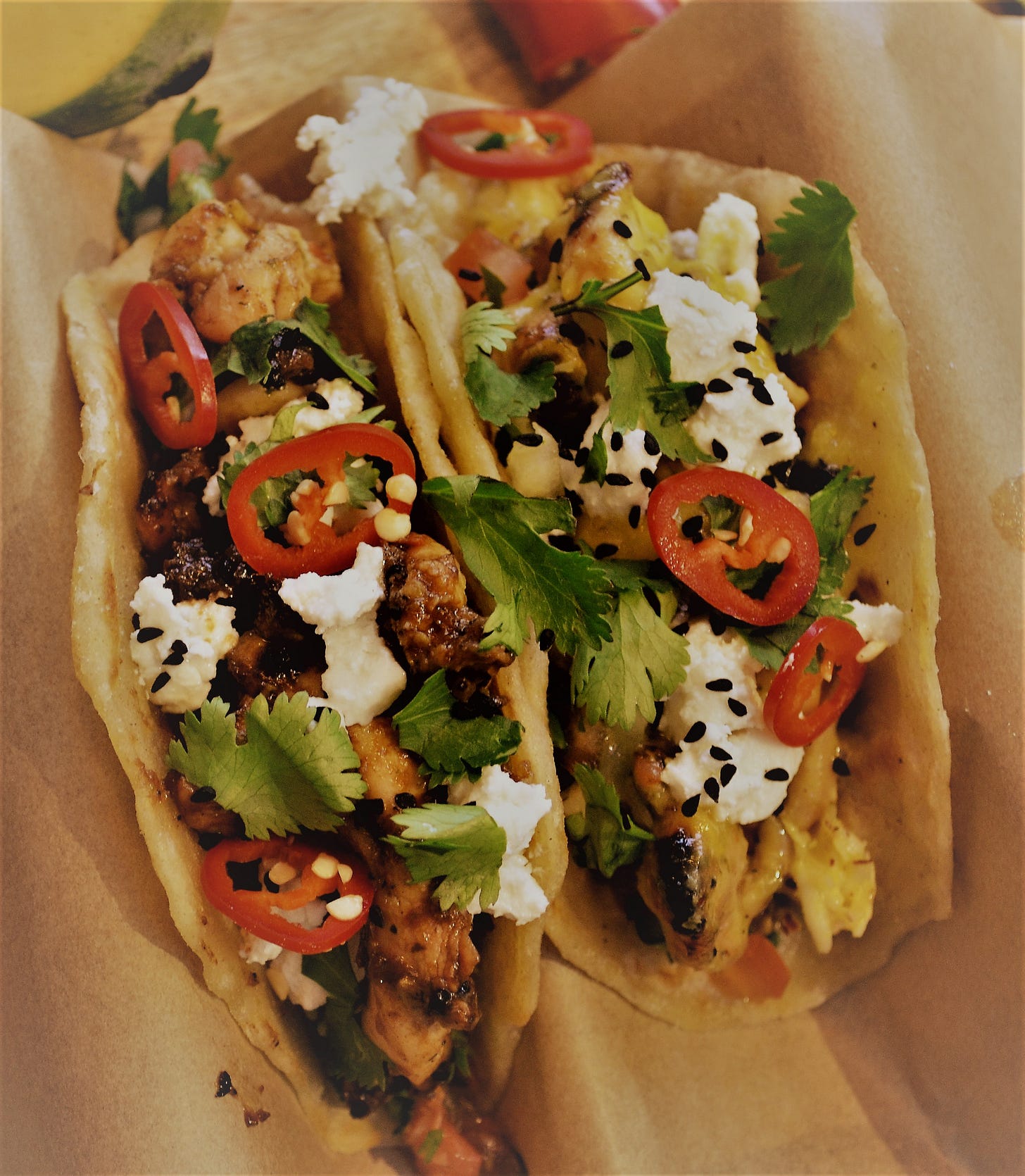Fozia Ismail’s shigni-glazed barbecued chicken thighs
A recipe for a summer party dish, plus an essay on what makes a meal of love. Words by Fozia Ismail. Photographs by Fozia Ismail and Georgia Rudd.
‘Better a dinner of herbs where love is’
There is that lovely biblical passage in ‘Proverbs’ that reminds us: ‘Better a dinner of herbs where love is than a stalled ox and hatred there with.’ When we as black women experience fully the transformative power of love in our lives, we bear witness publicly in a way that will fundamentally challenge existing social structures. We will be more fully empowered to address the genocide that daily takes the lives of black people, men, women and children. When we know what love is, when we love, we are able to search our memories and see the past with new eyes; we are able to transform the present and dream the future. Such is love’s power.
– bell hooks, Sisters of the Yam
Sometimes what you cook is delicious and worthy of sharing. Sometimes it goes spectacularly wrong.
In this column, I have been experimenting with yam or sweet potato recipes as a way of engaging with bell hooks’ work, Sisters of the Yam. I have thought about the transformative power of cooking, and company, and about how Black women can provide care for one another in a world that is not designed for us. As I wrote in my first column, this impulse stemmed from gatherings I held at home before the COVID-19 pandemic, which were for Black women to come together, eat, laugh, and share. Most of the experiments have gone well, but some have involved more trial and error than others. For this last column, I tried – and tried, and tried – to get a sweet potato version of a qurac, or Somali doughnut, to work. Inspired by memories of my mum’s quracs, which I grew up eating and loving, I was convinced that this would be the ideal culmination of my column’s theme.
I first tried with orange-fleshed sweet potato, but after steaming I realised it had too high a moisture content, which made the dough too sticky to roll. I then used a purple-skinned white variety of sweet potato. Roasting it rather than baking it increased the sweetness, but the outside became too crisp, which wouldn’t work for doughnuts. In my third attempt, I tried to simply adapt my mum’s qurac recipe. To the recipe’s self-raising flour, yoghurt, and cardamom, I added some sweet potato mash. Although it worked well from a taste perspective, it was far too dense and heavy and completely refused to rise.
By that point, I felt like an utter failure. But as I sat there, feeling dejected, I reflected back on why I wanted to write about Sisters of the Yam in the first place. Yam is not my favourite ingredient, or even something that I cook with particularly regularly. But I focused on it in this column to think about what it represents for people across the African diaspora. Yam was something to gather and write around, a tool to bring our experiences to the fore.
The humble yam or sweet potato is about more than nourishment: it tells of sometimes-painful histories, and legacies of colonialism and enslavement, as illustrated by Leah Penniman’s beautiful essay about the Vodun harvest festival of Manje Yam in the wonderful compendium, Black Food. ‘Our ancestral grandmothers in the Dahomy region of West Africa braided seeds and promise into their hair, before being forced into the bowels of the trans-Atlantic slave ships,’ she writes. ‘The seed was their most precious legacy.’ Penniman describes how this cultural legacy continues to manifest through the gathering of friends and family to honour the spirit of the yam. This vegetable is a thread running through our histories.
Within this context, the act of preparing food is not separate from wider political structures that inform the world. As hooks wrote, cooking can be a form of love that transforms the present and allows us, as Black people, to access the future. Perhaps it is the Somali in me, but this is what I feel best able to offer to people and my communities. So, for this final column, given that my sweet potato doughnuts were such a spectacular failure, I gave myself permission to decentre the yam and to focus instead on cooking as an act of care. I wanted to go back to a dish that has always been popular with my friends and family, a dish that to me symbolises the act of gathering together.




